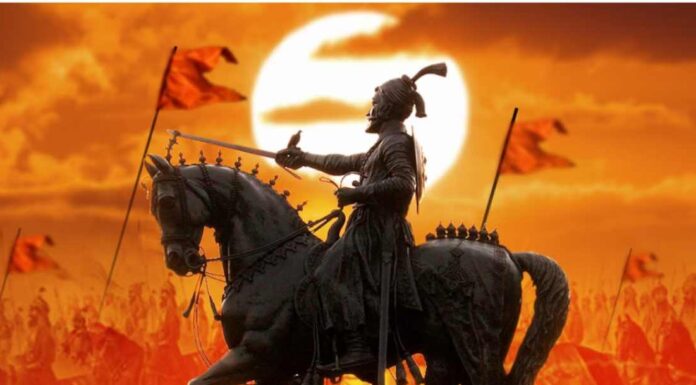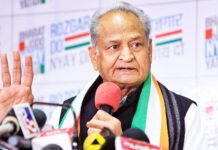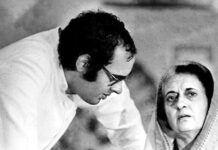As a tribute to this great son of Bharat, the Maharashtra government in a landmark move, decided to set up a Centre of Excellence in his name at Jawaharlal Nehru University
India’s historical and cultural fabric is deeply interwoven with the legacies of its great leaders. Among this impressive and inspiring pantheon, Chhatrapati Shivaji Maharaj stands as a towering figure whose visionary leadership, military acumen, and exemplary governance laid the foundation for Hindavi Swarajya (self-rule by Hindus). At a time when India was fragmented and ruled by foreign powers, Shivaji Maharaj emerged as a beacon of indigenous self-rule, proving that good governance transcends divisive considerations of religion, caste, ideology and upholds justice, harmony and meritocracy.
Chhatrapati Shivaji Maharaj (1630-1680) was not merely a warrior but a reformer who introduced governance systems that outlasted his reign. His political acumen was remarkable, as he successfully established Swarajya (self-rule) amid the dominant Mughal and Deccan Sultanates, proving that indigenous governance could thrive even in trying circumstances, with strong fundamentals like merit-based appointments rather than the feudal or hereditary systems prevalent at the time. He promoted decentralized administration, empowering local officials and village heads to make decisions based on ground realities. This approach fostered accountability, transparency, and participatory governance, setting an early example of an inclusive and people-centric administration.
In the field of defence, Shivaji Maharaj revolutionized warfare by pioneering guerrilla tactics. Unlike traditional battle strategies that emphasized direct confrontations, his approach relied on stealth, speed and the element of surprise while leveraging the terrain to his advantage, resulting in grand successes over much larger armies and stronger adversaries. His military success was reinforced by a well-organized cavalry and an extensive network of over 300 forts that were either built or recaptured under his leadership, each strategically placed to facilitate both defense and offense. These forts played a crucial role in his military campaigns, making them impregnable strongholds against enemy invasions. Shivaji Maharaj was one of the few Indian rulers who recognized the importance of naval power. His formidable naval fleet secured India’s coastline against European and local maritime threats, making him a pioneer of naval strategy in India, a legacy acknowledged by the modern Indian Navy, which honours him as the “Father of the Indian Navy”. This military genius had a strong humanitarian side as well that was intact even in times of war. Women and prisoners were treated with respect under his rule, a stark contrast to the prevailing norms of warfare during that era. An important lesson—values and ethics are meant to be upheld at all times.
Shivaji Maharaj has often been celebrated as the protector of Hindu Dharma. He worked tirelessly towards reviving and preserving Hindu traditions, temples, and cultural heritage. His coronation in 1674, performed with elaborate Vedic rituals under the guidance of Kashi scholar Gaga Bhatt, symbolized the restoration of Hindu sovereignty in a land ruled by Islamic invaders. Another critical aspect of his rule was the protection of local languages. Persian was the dominant language under Mughal rule, but Shivaji Maharaj encouraged the use of Marathi and Sanskrit in administration, fostering a cultural renaissance that helped preserve indigenous linguistic traditions and restore pride in ones roots, thereby rekindling a sense of belonging.
Despite being a devout Hindu king, Shivaji Maharaj practiced religious tolerance. He ensured that his administration was meritocratic, appointing officials based on their abilities rather than their religious affiliations. He had several Muslim commanders, diplomats, and soldiers. He banned the destruction of places of worship of any faith and stopped levying faith-based tax. This prompted history distortionists to label him a “Muslim appeaser”, which is a far cry from reality. As a matter of fact, his engagement with Muslims was based on the pragmatic tenets of good governance and not on ideological appeasement or vote-bank politics like today. His overarching identity was one of a Hindu king fighting for Hindavi Swarajya (self-rule) and carving a formidable Hindu Samrajya (empire), an identity that he took pride in and upheld till his very last breath.
Even after his death in 1680, he kept inspiring leaders and common masses alike. In 1857, India’s first war of Independence, Shivaji Maharaj’s idea of Swarajya remained the guiding principle, instilling national pride and strengthening national morale. His influence extended far beyond his time. His vision of self-rule became a source of inspiration for India’s independence movement. Leaders like Bal Gangadhar Tilak and Veer Savarkar frequently invoked his legacy, emphasizing Swarajya (self-rule) as the fundamental goal of the national movement. Tilak’s historical war cry against the colonial masters, “Swarajya is my birthright, and I shall have it,” was deeply inspired by Shivaji Maharaj. His legacy as one of the greatest Hindu warriors and statesmen remains an inspiration for all Indians even to this day.
Chhatrapati Shivaji Maharaj was a fine amalgam of Shaastr and Shastr, i.e., Knowledge and Power. His contribution to national security and strategic culture is unparalleled, one that needs to be saluted and systematically studied by students and policymakers alike. His military strategies continue to be studied in modern defense academies worldwide, particularly his guerrilla warfare tactics, strategic retreats, night raids, deception-based manoeuvres, etc. His emphasis on territorial awareness and adaptability remains relevant for contemporary military operations like counterinsurgency operations and asymmetric warfare. Additionally, his focus on strategic culture introduced a broader concept of national security that went beyond military defense. He understood that securing a nation required protecting its people, values, culture. institutions and economy from both external invasions and internal decay. It made the national security discourse richer, deeper, more comprehensive. meaningful and holistic.
As a tribute to this great son of Bharat, the Maharashtra government in a landmark move, decided to set up a Centre of Excellence in his name at Jawaharlal Nehru University. The establishment of the Chhatrapati Shivaji Maharaj Centre for Excellence in JNU represents a progressive move toward preserving India’s historical and cultural legacy. The Centre is expected to serve as a hub for research and policy analysis, ensuring that Shivaji Maharaj’s governance models, military strategies, and cultural policies are not just remembered but studied and implemented in contemporary governance and strategic studies.
As India strides forward into the 21st century, embracing its rich heritage, such initiatives reinforce the importance of historical awareness, linguistic pride, and cultural identity. The ideals of Swarajya, justice, and strategic culture that Shivaji Maharaj championed will continue to guide and inspire future generations, ensuring that his legacy remains an integral part of India’s nation-building journey.
Chhatrapati Shivaji Maharaj’s life was a testament of courage, conviction and capability. His story deserves to be told, studied, and celebrated across generations. Maharashtra government’s proactive initiative is an investment not just in academia but in the very soul of India’s history, ensuring that the ideals of Swarajya forms the bedrock of the body politic called Bharat.
* Aayushi Ketkar is a Faculty at the Special Centre for National Security Studies (SCNSS) at JNU








